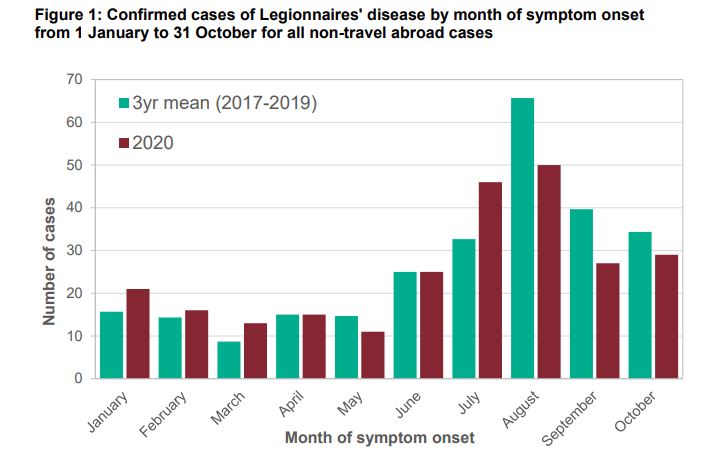
Are legionella tests a legal requirement?
Landlords are not legally required to produce a formal certificate in the same way they are expected to have an EICR, EPC or Gas Safety Record.
This is another one of those confusing areas where the law states one thing and yet landlords are required to do another or potentially face prosecution, as they do in fact have a legal duty to assess and control the risk of exposure to legionella. So how on earth do you do that if you can’t produce a certificate showing that it is safe at the time of inspection?
What is legionella?
Legionella is a form of bacteria that causes a pneumonia-type illness called Legionnaires’ disease.
The respiratory infection is a form of pneumonia which, according to The Housing Health and Safety Rating System, has a 10 to 15% of cases proving fatal. The pathogen can grow and reproduce when water temperatures remain between 20°C and 40°C.
The Health and Safety Executive (HSE) states: “Stagnant water favours legionella growth.”
It can be contracted if someone was to breathe in small droplets of water in the air containing the bacteria.
There are a range of symptoms a tenant could be affected by if they were to be infected with the disease:
- High fevers
- Coughing
- Headaches
- Shortness of breath
- Nausea
The risk of legionella is profiled within the ‘water supply’ risk of the House Health and Safety’s list of hazards.
The document suggests that in order to prevent the risk you should take out a visual examination of the installations and fittings within the dwelling for the supply of water, then check the water visually and for odours.
It is usually found within water systems of a property, including water tanks, pipes, showerheads and baths.
Statistics
On average, there are approximately 200-250 reported confirmed cases of Legionnaires’ disease each year in England and Wales and it is thought that the total number of cases may be underestimated. About half of the cases are associated with travel abroad. (Source: HSE)


The data displays an overall decrease in cases of legionnaires’ disease in England and Wales before and during the coronavirus pandemic. The East Midlands alone has seen a lower figure in 2020 than the mean between 2017 and 2019. (Source: HSE)
The decrease could suggest that private rented student properties are skewing the results for the numbers of legionnaires’ disease cases.
Why is this?
Many students returned to family homes to enjoy company and a cheaper living situation amidst the pandemic. Thus, meaning rented properties were left unoccupied. All the more reason for landlords to complete a quality risk assessment.
So, are rented properties to blame for the majority of legionella cases?
Does this mean we need to be stricter on legionella assessments and risks?
Highlighting the figures in Nottingham, the data shows that there were 30 cases of Legionnaires' disease. In relation to the fatality rate published by the HHSRS, mentioned above, a conservative figure would suggest that 3 of those people with the disease have died of it. Looking at the higher range of the fatality percentage bracket, at least 4.5 of those infected would have died.
The landlords or letting agent would be liable for those deaths within the property they own or manage and would face an unlimited fine decided by a court of law.
Preventive measures for landlords
To reduce the risk of legionella infesting your property you should remove dead ends in your pipe-work, flush out infrequently used outlets (for example if your tenant is away from the property for a prolonged period of time), and advise tenants de-scale showerheads frequently.
The HSE suggests, in order to minimise legionella growth, a landlord should
- keep pipework as short and direct as possible,
- adequately insulate pipes and tanks,
- use materials that do not encourage the growth of legionella,
- fit tanks with lids and insect screens to prevent contamination,
- ensure that vermin are not an issue in the property as they can be a source of contamination example – for example in the water tank.
How to test for legionella
Most landlords can assess the risk of the bacteria themselves, making the compliance inexpensive and straightforward. Legally, landlords do not need to be accredited legionella assessors (in England).

The following need to be assessed by the landlord or legionella assessor:
- Identify potential hazards
- Identify who is at risk
- Examine water temperatures
- Test for limescale
- Test water systems for legionella
- Implement adequate control measures
- Record the findings for review of the assessment
Legionella risk assessments should be reviewed approximately every two years and before a new tenancy begins.
Review the risk assessment
It is not a legal requirement to have a legionella risk assessment reviewed by a professional. However, as mentioned above, Legionnaires’ disease has a 10% to 15% fatality rate meaning a landlord could get into a lot of trouble if something was to go terribly wrong in their property. If a tenant were to contract the disease from the water system in their home, the landlord may be liable to prosecution.
Make sure you have followed procedures correctly!
Summary
Health and safety law does not require landlords to obtain a ‘legionella testing certificate’. They can also complete the assessment themselves. There is clearly very minimal stress required to address the bacteria.
So, the answer to the question:
‘Should a landlord do the bare minimum to protect the occupiers of their rental property?’
In my opinion, the answer is a resounding ‘Yes’. As the presence of legionella can put your tenants at risk of a possibly fatal disease, I would argue that legionella assessments be held in higher regard. But should they require professional treatment?


